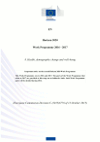 The headline goal of the 'Health, Demographic Change and Well-being' Societal Challenge is better health for all. Its main policy objectives are to improve health and well-being outcomes, to promote healthy and active ageing, to promote market growth, job creation, and the EU as a global leader in the health area. The challenges to this goal derive from the ageing of European population and lifestyle patterns, which, if not actively managed through a life-course approach, will increase the burden of chronic diseases on individuals, on existing health and care systems and on society. This will also result in increase of public expenditure coupled with labour force and productivity losses.
The headline goal of the 'Health, Demographic Change and Well-being' Societal Challenge is better health for all. Its main policy objectives are to improve health and well-being outcomes, to promote healthy and active ageing, to promote market growth, job creation, and the EU as a global leader in the health area. The challenges to this goal derive from the ageing of European population and lifestyle patterns, which, if not actively managed through a life-course approach, will increase the burden of chronic diseases on individuals, on existing health and care systems and on society. This will also result in increase of public expenditure coupled with labour force and productivity losses.
The overall strategic orientation for the 'Health, Demographic Change and Well-being' Work Programme 2016-2017 is 'promoting healthy ageing and personalised healthcare'. It directly links with what has been successfully initiated in the years 2014-2015. The programme will implement several research priorities: personalised medicine, rare diseases, human bio-monitoring, mental health, comparative effectiveness research, advanced technologies, e/m-health, robotics, patient empowerment, active and healthy ageing, data security, big data, valorisation, anti-microbial resistance, infectious diseases including vaccines, maternal and child health and the silver economy. In addition, Pilot 1 'Smart Living Environments for Ageing Well' of the focus area call on 'Internet of Things' is jointly implemented by the "Health, Demographic Change and Well-being" Societal Challenge and the "Leadership in enabling and industrial technologies Information and Communication Technologies" (ICT LEIT) (see topic IoT-01–2016: Large Scale Pilots in part 17 of the Work Programme). Those priorities will support the development of evidence-based health and care policies, resulting from scientific research data, ICT solutions and good practices in interventions improving efficiency and quality of health and care systems.
Download: Horizon 2020 Work Programme 2016-2017: Health, Demographic Change and Well-being (.pdf, 932 KB).
Download from eHealthNews.eu: Horizon 2020 Work Programme 2016-2017: Health, Demographic Change and Well-being (.pdf, 932 KB).